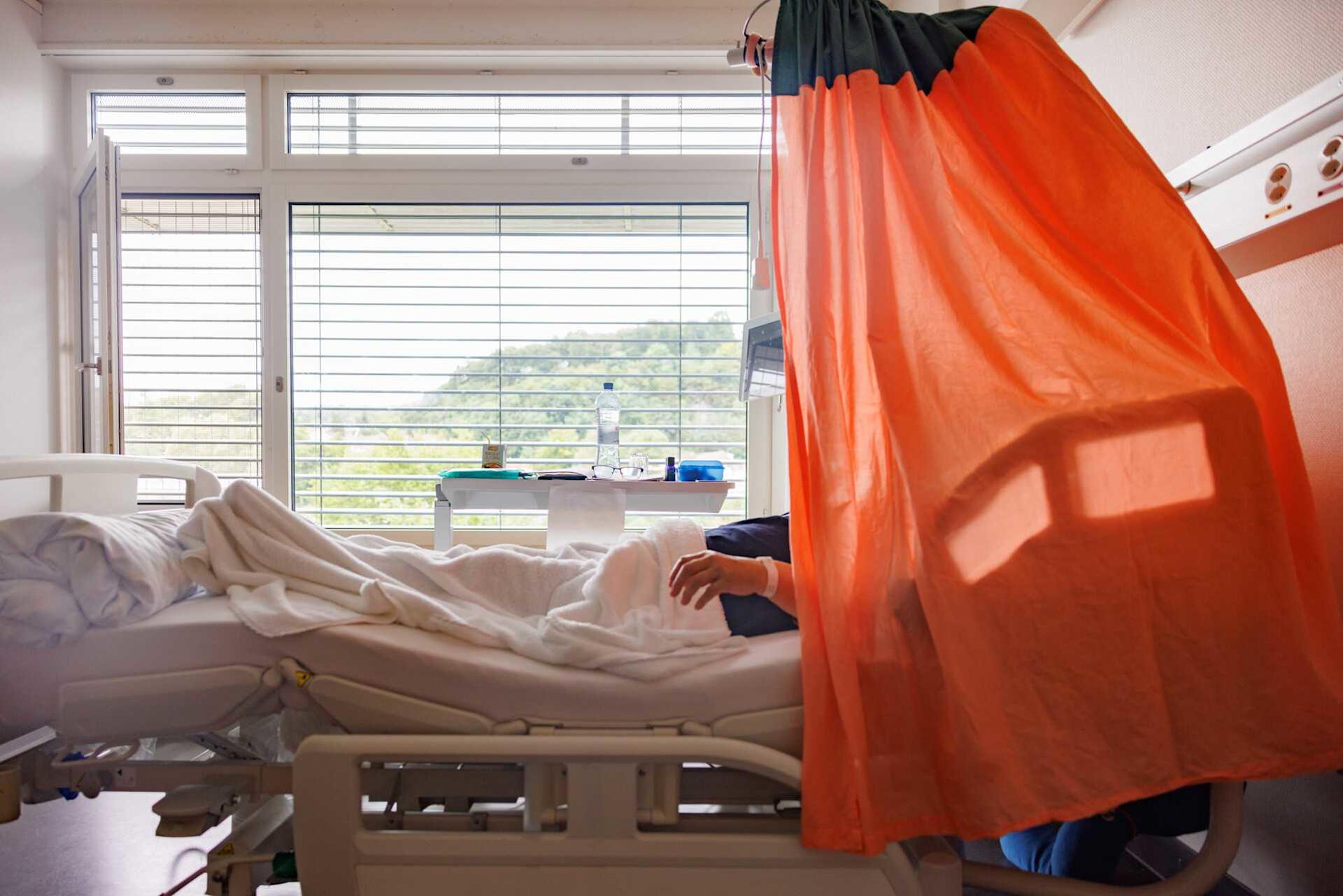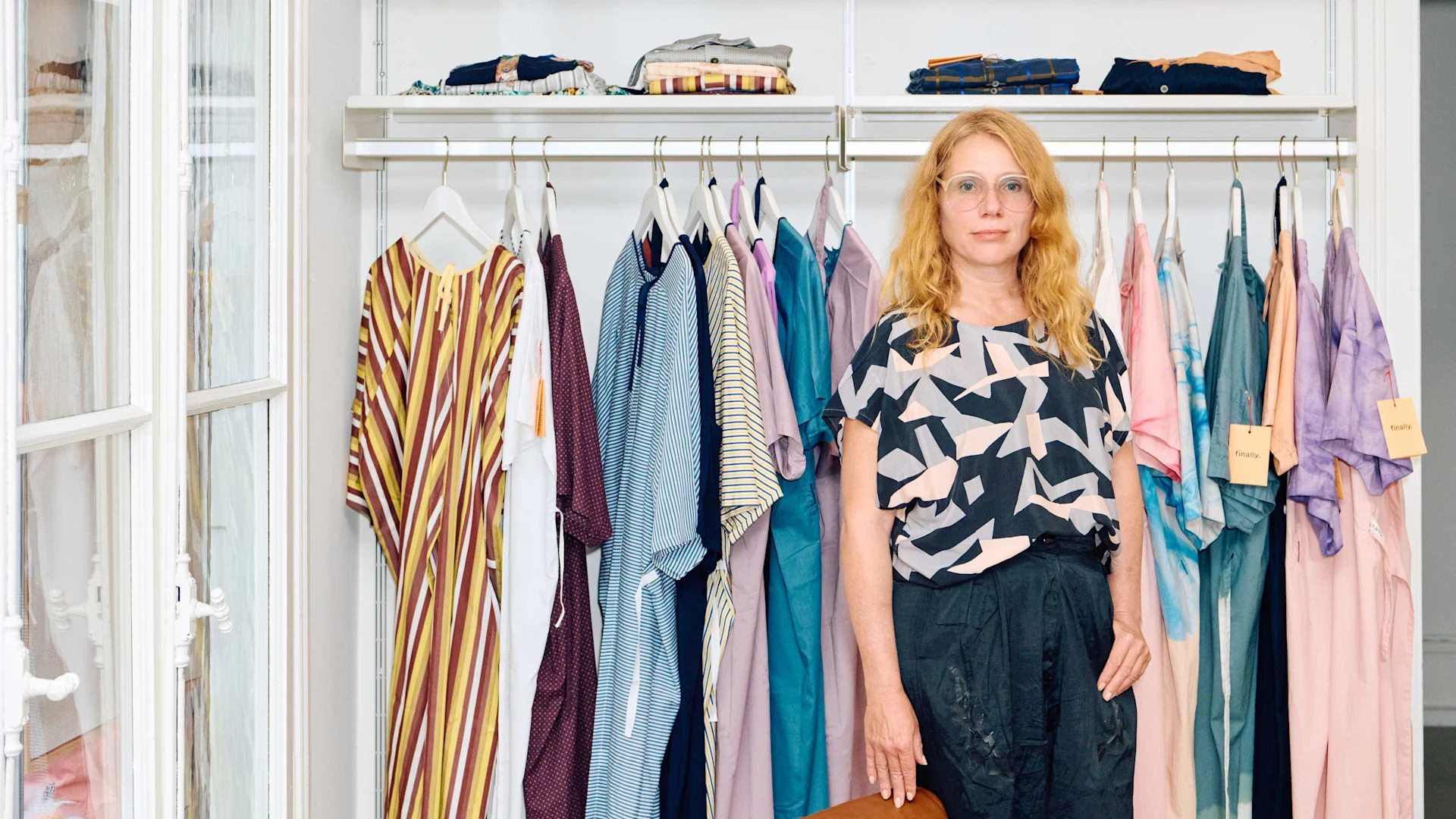
Striking a balance between work and family life
Two Migros employees talk about the balancing act of being parents, looking after their children and having a career.
navigation

Migros Pioneer Fund
Bitten Stetter ran a high-profile international fashion label until her mother died of cancer after a protracted illness. Today, she designs products for people in the final phase of their life. Her main aim is to prompt reflection.
"Can you buy me something nice to wear?" This question changed Bitten Stetter’s life. It was something her mother had asked her in 2015 as she lay in a hospital bed, wearing a pale nightgown. The cancer had already reached her bones.
Stetter set off right away. She scoured high-street shops and online stores for clothes that her mother might like and which wouldn’t get in the way of her carers. To no avail. In the end, she bought a pair of regular pyjamas, got her old sewing machine out of the basement and re-purposed them, adding a split at the back with a row of buttons as well as a drawstring on the trousers to make them easier to open. It was a simple task for a renowned international designer. The idea would later spawn a separate brand.
"Just because you’re ill, you don't stop wanting to be surrounded by beautiful things," Mirjam Weber says. Weber is a senior consultant at the palliative care unit of Olten cantonal hospital. She looks after people who have often been ill for many years and are approaching the end of their life.
People like Stetter's mother at the time. Speaking to us at her Care studio in Zurich, the 52-year-old designer recalls how her mother had gone to the doctor in 2011, complaining about neck pain. The studio doesn’t seem like a place associated with death. Behind her are colourful, ceramic spill-proof cups, a vase candle with paper flowers stands in a showcase, on whose sides hang long, batik-pattern dresses.
"She was diagnosed with lung cancer," Stetter says, summarising the next four years in three words: operations, chemotherapy and radiotherapy. Then finally, they could breathe a sigh of relief: "The doctors told us that she was healthy again." While her mother was still in rehab, the family celebrated this new chapter in their lives. Five months later, her mother passed away. The cancer had already spread to her bones.
"Every new treatment gives you renewed hope," Stetter says, pausing for a moment. Lowering her gaze behind her heavy brown glasses to the tabletop, she eventually adds, "I think that’s why you refuse to accept that it could all soon come to an end."

After her mother’s death, Stetter struggled to understand: how could she have been so unprepared? She paused the fashion label that she had been running for 15 years, with shows around the globe. She also took a break from her position as Professor of Design at Zurich University of the Arts.
Instead, she changed bedpans and held the hands of the dying as part of an internship in the palliative care ward of Zurich’s Waidspital hospital. She also began doing some research. Her project, 'Sterbesettings,' explored how the end of a person's life could be addressed differently. "We associate dying with death. But they’re not the same thing. Dying is a part of life."
Stetter wants to design products for this phase of life. She developed the first prototypes while still conducting her research. Initially, they were mainly practical things, she says. For instance? She shows us. "The bed-box concept came about when my mother was still in hospital," Stetter explains, holding up a storage box with two velcro straps. She was constantly looking for things while she was there: her mobile phone, glasses, knitting ... Everything was always out of reach. This often led to stressful situations, which is why Stetter went home one day, fetched an old bicycle basket from her garage and hung it on her mother’s hospital bed. This gave her a place to keep her things where they would always be on hand.
Stetter moves on to the nightgowns. "Everyone in hospital wears the same anonymous clothes." This inspired her to experiment with colours and materials. In so doing, she created the "turnarounder" quite by chance. "I had put on a hospital gown backwards and realised that it looked like an ordinary coat." This led her to develop an item that can be worn as a dress in good times and a nursing gown when required.
She soon added other products, including mobile phone holders for attaching to grab handles, magnetic pill boxes, easy-grip spoons and dice sets. The latter offer a light-hearted approach to discussing difficult issues, such as treatment options, burial and fears.
"Very few of us will simply fall asleep. Dying isn’t an event, but a process," Stetter says. She hopes that her work will provide more than mere functional benefits. She wants to bring about social change. "We have to accept that we’re a part of nature and therefore mortal," she insists. The brand name Finally came out of this train of thought.
It's about accepting the inevitability of our death. That’s also an important issue for senior consultant Mirjam Weber. "We live in a society that plans everything down to the minutest detail, yet we’re totally unprepared for the end of life," she says, her hands in the pockets of her white tunic. She leads us into the next room, where colourful gowns and canopies hang from a rail. The hospital in Olten was one of the first to use Finally products.
So far, the feedback has been overwhelmingly positive, Weber says. The hospital would like to buy even more of these products, but it's working on a tight budget. It was only able to afford the ones it has through financial assistance. "We currently still produce in small batches, which is why the prices are still quite high," Stetter says. She hopes that more hospitals will become interested soon. Support from the Migros Pioneer Fund enabled her to expand her team and take the project to the next level.
Stetter is someone for whom dying is a part of her daily life. This inevitably raises a question about how she feels about the end of her own life. Her answer? "When the time comes, I hope that I can appreciate that quality of life matters more than longevity."
Discover exciting stories about all aspects of Migros, our commitment and the people behind it. We also provide practical advice for everyday life.